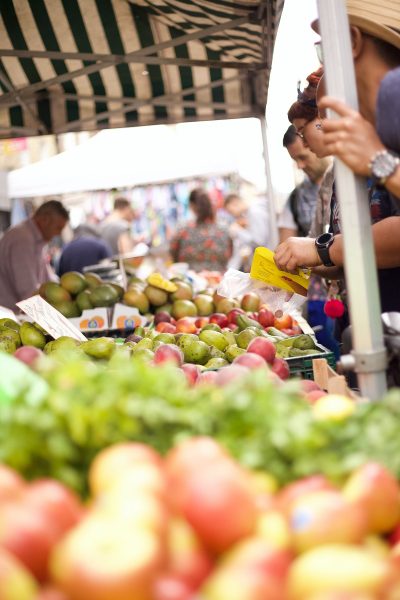
Back to basics – Why tapping into local resources is key to creating a sustainable city – An interview with Kerry Melville (2/2)
01/06/2020
In part two of our feature, Kerry Melville discusses her role as part of the Strategy Board for the UK initiative ‘Peas Please’, why they are pushing for people in Northern Ireland to have access to fresh, local and seasonal produce, why we should be supporting the city’s Nourish scheme, and how they plan to build upon Belfast’s Sustainable Food City status.
You are part of the Strategy Board for a UK initiative called ‘Peas Please’. Could you share with us a little bit about this project and how you envision NI being a part of it?
Peas Please is a very interesting initiative that was set up by the Food Foundation to try and get people to eat more vegetables. We all know that we are supposed to eat at least five, if not seven portions a day, but very few people reach that. Northern Ireland is currently the worst in the UK in terms of vegetable consumption. I think some of that can be linked to issues around accessibility. That may sound a little strange when most people have access to supermarkets. However, if you think about a supermarket shop floor, maybe 5% of it is comprised of vegetables and so what is in the other 95%? Why would anyone be buying 95% in vegetables and only 5% of the rest of the items when it is presented the other way around? So, there are complicated issues around the way that people perceive things and how we are manipulated into buying certain things. The psychology behind supermarkets is really scary and it has become so normalised that people no longer question it. Ultimately, there is a huge disconnect between what is good for us and what and what is actually put in front of us as a consumer. We are also losing our cooking skills quite dramatically. We need to be teaching good quality cooking techniques at a young age so that children can grow up being able to look after and sustain themselves.
This initiative is huge, it spans the whole of the UK, and has gained over 100 pledges from the industry which is really interesting. It includes three different factions; community, schools and industry. The industry is being asked to pledge to put more vegetables in ready meals and various items they are selling, and that is working extraordinarily effectively. The schools’ portion is a new piece of work that includes a three-year project. The first part surrounds research into how the UK food system works, what are the differences between regions, where does the food for NI schools come from? Who makes it? And how does it get to your child’s plate? Through Peas Please, we want to find out exactly what is going on and see if there is a model that we could use to try and re-localise our supply chain. The community aspect is about trying to locate vegetable advocates – people who live in communities that are conscious about the food they are eating, the food their children are eating, and are trying to get their heads around what is happening with the food in front of them. We are aiming to build up a network of vegetable advocates, with no more than 100 of them across the UK. Over the next three years, we envision that these 100 advocates will work with the industry to make it easier for people to buy vegetables.
Daily food waste is a massive issue, which arguably is making all diets unsustainable regardless of what they are. With 50% of food waste being generated at home through things like poor portion control and inadequate food storage – what are the challenges in NI that make this a difficult issue to tackle?
Food waste is a massively complicated issue. It is always blamed on the consumer, yet there is very little recognition within that about what the consumer is being sold. Generally speaking, the majority of people are doing their shopping in supermarkets, where the produce on offer is covered in expiration dates and plastic packages, which generally cannot be recycled. We are told how much we can have and what day we have to stop eating it by, whereas if you go to a greengrocer, that does not happen. Instead, you buy exactly what you want and don’t eat it if it looks bad. Therefore, I feel that it is something around the way food is sold that is creating more waste. We are caught up in this dialogue where we are told that we need to do weekly shops, buy all the food we need for that duration of time and eat it all. However, what is actually happening is that we are being sold probably two or three times more food than we actually need. For instance, there is no recognition, of the fact that a consumer may only need one apple instead of six being offered. I think it is important when we are talking about food waste to recognise how we are in fact, set up to create waste. What we want to push for is people having access to fresh, local and seasonal produce at every given opportunity so that every time they are buying this produce, they are supporting the local economy too. Ultimately, these are the baby steps that we are trying to push for and change.
At the moment, we are working with DAERA on a food policy which has a really good sustainable vision. If we got this pushed through, that would radically change NI. We are also in the process of developing a food manifesto for NI and if that goes through, then we will be launching it at an event next January, as we are going to try and put on NI’s first real food and farming conference.
Food poverty is also a growing issue here in NI. Currently, a lot of our ground-level work is focussed on community engagement, building community skills and tackling food poverty through our Nourish Programme. This is a food citizenship programme that uses food as a vehicle to talk about the whole food system. It is a programme that is changing people’s perceptions about food and it makes people think about the messages they are being subjected to in supermarkets and through advertising. The food poverty work here is crucial because we’ve got 14 food banks which are disgraceful for a city of this size. There was only one in 2007, and we should really have none because foodbanks are not really the answer. They are just a sticky plaster and create a CSR exercise for big supermarkets and businesses that have very inefficient supply changes, so create a vast amount of waste. So, whilst on a simplistic level, it makes sense because we are giving food to people that cannot afford food, in reality, it doesn’t provide any solution but props up a problem and a broken system.
We have now been fortunate enough to have five community shops introduced to NI. Delivered by the Department of the Communities, the idea behind them is that it is no longer a food bank, but are more of a cooperative, where they are reacting to the needs of the community and are deeply embedded with local farmers and the economy.
Finally, Belfast was one of five cities in the UK to secure Sustainable Food City status. Looking forward, what areas would you like to see attention given to in order to build upon this
We received this award in 2016 and have managed to retain it for three years, which is excellent as it had been a struggle without an Executive during that period of time. At the moment, half of our work is in Belfast and half of our work is regional. In Belfast, we are looking at things like Healthy Start, the Nourish Programme and the Sustainable Fish Campaign. Then nationwide, we have the Food Forum NI which is a food poverty network. However, there are major issues that we have to address going forward if we have any hope of moving from bronze to silver. When you go from bronze to silver, it gets interesting because you can see it. For instance, when you walk into a silver awarded sustainable food city, it feels completely different and you can see it by the volume of food growing in city centres in public spaces and community gardens. There will be a plethora of small independent food shops supported by local councils and by their political system. Unfortunately, this is not yet the case here. So, we need to start giving attention to things like community growing and what that means, and why our community gardens are currently not growing food. At the moment, a lot of community gardens are being set up for community development reasons but not food reasons and that is a massively untapped resource which is really important. Waste is another issue we want to address further because whilst a lot of it is collected across the province, the food waste could still be used for a lot more than compost. We would like to look at how we could turn food waste into energy, designed and maintained by communities. We are hoping to get the opportunity to look at that more seriously this year because ultimately, we live in a wealthy, western society and we should be introducing systems and ways to take care of our populace, all of it.
Are you are your business interested in getting involved with the Belfast Food Network? You can get in touch with Kerry here.
Did you miss Part One of Kerry’s interview? Take a look at it here.

